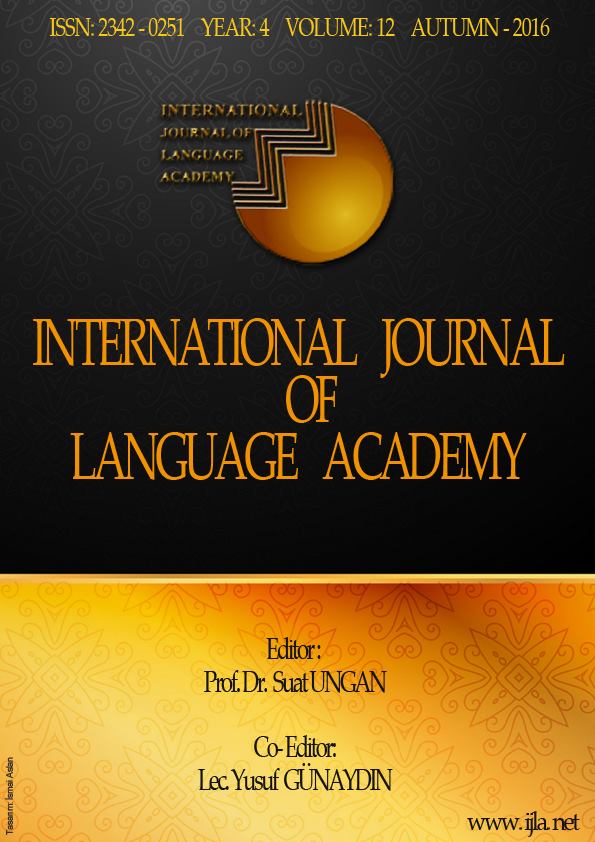Author :
Abstract
Bu makale Çukurova Üniversitesinde yapılmış olan “Türkiye’de İngilizce Öğretmenliği Hazırlık Sınıflarında Kaynak Kültürü Kullanarak Okuma Becerisindeki Öz Etkililiğin Artırılması” başlıklı daha geniş bir yüksek lisans çalışmasının bir parçasıdır. İngilizceyi yabancı dil olarak öğrenen sınıflarda hedef dil kültürünün öğretimi ile ilgili pek çok çalışma yapılmıştır. Ancak yabancı dil öğretiminde kaynak kültürün yeriyle ilgili araştırma sayısı yetersizdir. Bu çalışmada, hedef dilde yapılan okuma metinlerine kaynak kültürle ilgili konu ve öğelerin eklenmesi halinde, konuya aşina olunduğundan bunun yabancı dil öğrenimine katkıda bulunacağına inanılmaktadır. Dolayısıyla bu çalışmanın amacı, hedef dilde okunan metinlerde kaynak kültüre yer verilmesinin okuma becerisini ve okuma becerisi notlarını etkileyip etkilemediğini ortaya çıkarmaktır. Okuma becerisinin özellikle seçilmesindeki sebep, İngilizce öğrenen öğrencilerin hedef dile daha çok okuma aracılığıyla maruz kalmalarıdır. Çalışma, Çukurova Üniversitesi Yabancı Diller Yüksek Okulu’nda, biri kontrol biri deney grubu olmak üzere iki üçüncü düzey sınıfla yapılmış, on hafta sürmüş ve öğretmen günlüğü, öğrenci yazılı ve sözlü dönütleri (geri bildirimleri), kullanılmış, ayrıca öğrencilerin ilk akademik dönem boyunca okuma becerisi bölümlerinden aldıkları sınav notları da incelenmiştir. Nitel sonuçlara göre katılımcıların çoğu İngilizce okuma metinlerinin Türk kültürü öğelerini ve konularını içermesinden çok hoşlanmış ve konular aşina olduğundan bilinmeyen İngilizce kelimeleri daha kolay tahmin etmiştir. Ayrıca kendi kültürleri ile ilgili bilgileri artmış ve bu da öğrencilerin çok kültürlü bağlamlarda kendi kültürlerini paylaşabilecek hale gelmelerine olanak sağlamıştır.
Keywords
Abstract
This article is one part of a larger master thesis titled “Increasing Self-Efficacy in Reading Skill through use of Native Culture in Turkish ELT Prep Classes” conducted at Çukurova University. There have been many studies into the teaching of target culture in EFL classes; however, little has been done into the place of native culture in foreign language teaching. It is believed that incorporating the native culture into reading in the target language may provide familiarity with the topic and contribute to foreign language learning. Therefore, the aim of this study is to discover whether reading about the native culture in the target language may affect students’ reading skill and their reading marks or not. Reading was significantly chosen because the students are exposed to the target language in EFL classes mostly through reading. The study was carried out for ten weeks with two Level 3 ELT prep classes, one experimental and one control group, at Foreign Languages Centre, Çukurova University, Adana using teacher diary, student minute papers, student oral feedback, and comparison of reading average marks. The qualitative results indicated that the topics about the native culture appealed to the majority of the participants, made vocabulary guessing easier and increased their knowledge about their own culture, permitting them to be able to share it in multicultural contexts.
Keywords
- Alptekin, C. & Alptekin, M. (1984). The question of culture: EFL teaching in non- English- speaking countries. ELT Journal, 38(1), 14-20.
- Alptekin, C. (1993). Target-language culture in EFL materials. ELT Journal, 47(2), 136-
- Bandura, A. (1994). Self-efficacy. in V. S. Ramachaudran (Ed.), Encyclopedia of Human Behaviour, (vol. 4, pp. 71-81). New York: Academic Press. Retrieved from http://www.des.emory.edu/mfp/BanEncy.html
- Çakır, İ. (2006). Developing cultural awareness in foreign language teaching. Turkish Online Journal of Distance Education (TOJDE), 7(3), 154-161.
- Ekiz, T. (2013). The other face of the mirror: Increasing teacher motivation to learn the culture of the target language. Paper presented at IV. International Student Conference. May 6. Çukurova University, Adana, Turkey.
- Erten, İ. H. & Razı, S. (2009). The effects of cultural familiarity on reading comprehension. Reading in a Foreign Language, 21(1), 60-77.
- Ghonsooly, B. & Elahi, M. (2010). Learners’ self-efficacy in reading and its relation to foreign language reading anxiety and reading achievement. Journal of English Language Teaching and Learning, 53(127), 45-67.
- Girma, M. (2008). Use of Students' Native Culture as a Resource in the EFL Classroom: The Case of Second Year English Majors in the Department of English Language Education of AU. Unpublished dissertation. Addis Ababa.
- Jiang, S. (2011). A new interpretation of culture in teaching English as an international language. In Y. Wang (Ed.), Education and educational technology: Advances in intelligent and soft computing (pp. 693-699). Springer.
- Krashen, S. (1982). Principles and practice in second language acquisition. Pergamon Press Inc. Retrieved July 13, 2013 from aces.ir
- Lessard-Clouston, M. (1997). Towards an understanding of culture in L2/FL education. TESL Journal, 3(5).
- Li, Y. & Wang, C. (2010). An empirical study of reading self-efficacy and the use of reading strategies in the Chinese EFL context. Asian EFL, 12(2), 144-162.
- Lou, W. & Chism, R. L. (2011). Integrating Chinese culture into the EFL classroom. Academic Exchange Quarterly. Retrieved Aug 8, 2011 from http://findarticles.com/articles/mi_hb3325/is_4_9/ai_n29236315
- McKay, S. (2003b). Teaching English as an international language: The Chilean context [Abstract]. ELT Journal, 57 (2), 139-148.
- Nevill, M. A. (2008). The impact of reading self-efficacy and the regulation of cognition on the reading achievement of an intermediate elementary sample. Unpublished doctoral dissertation, Indiana University of Pennsylvania.
- Peck, D. (2013). Teaching culture: Beyond language. Retrieved July 3, 2013 from www.yale.edu/ynhti/curriculum/guides/1984/3/84.03.06.x.html
- Ran, Y. (2008). Integrating Chinese culture with Western culture in EFLT classroom. In A. Shafaei & M. Nejati (Ed.s), Global practices of language teaching: Proceedings of the 2008 international online language conference (IOLC 2008) (pp. 32-37). Universal Publishers.
- Richardson, J.S., Morgan, R.F. & Fleener, C.E. (2011). Reading to learn in the content areas (8th ed). Cengage Learning. pp. 329-336.
- Schunk, D. H. (2003). Self-efficacy for reading and writing: Influence of modeling, goal setting and self-evaluation. Reading and Writing Quarterly, 19, 159-172.
- adapted from:http://www.allaboutturkey.com/marriage.htm.02.10.2011





